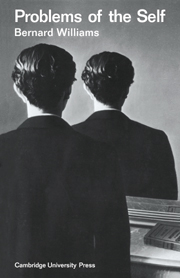Book contents
- Frontmatter
- Contents
- Dedication
- Preface
- 1 Personal identity and individuation
- 2 Bodily continuity and personal identity
- 3 Imagination and the self
- 4 The self and the future
- 5 Are persons bodies?
- 6 The Makropulos case: reflections on the tedium of immortality
- 7 Strawson on individuals
- 8 Knowledge and meaning in the philosophy of mind
- 9 Deciding to believe
- 10 Imperative inference
- 11 Ethical consistency
- 12 Consistency and realism
- 13 Morality and the emotions
- 14 The idea of equality
- 15 Egoism and altruism
- Bibliography
- Index of names
5 - Are persons bodies?
Published online by Cambridge University Press: 07 December 2009
- Frontmatter
- Contents
- Dedication
- Preface
- 1 Personal identity and individuation
- 2 Bodily continuity and personal identity
- 3 Imagination and the self
- 4 The self and the future
- 5 Are persons bodies?
- 6 The Makropulos case: reflections on the tedium of immortality
- 7 Strawson on individuals
- 8 Knowledge and meaning in the philosophy of mind
- 9 Deciding to believe
- 10 Imperative inference
- 11 Ethical consistency
- 12 Consistency and realism
- 13 Morality and the emotions
- 14 The idea of equality
- 15 Egoism and altruism
- Bibliography
- Index of names
Summary
Problems of mind and body arise at two levels. On the one hand, there are general issues concerning the relations between a subject's mental states and his possession of a body, including in particular their relations to his observable behaviour. On the other hand, there are questions concerning the relations between a subject's mental states and certain internal states of his organism (in particular, states of the central nervous system) which might in a developed psychophysical science be correlated with the mental states – the term ‘correlated’ here being not intended to beg any questions.
This second range of problems, which we might call problems at the micro-level, particularly concern how such a correlation may most illuminatingly and economically be characterised; and the most notable recent contribution to this area has been the group of views often called the ‘identity theory’ or ‘central state materialism’. It is not, however, with this range of problems that I shall for the most part be concerned in this paper, but rather with the first range of problems, problems at the macro-level. But it is worth noticing in passing one very important area of overlap between the two ranges: if the occurrence of a mental state (e.g., a sensation) is cited as the explanation of a piece of observable behaviour, the question arises of how such an explanation is related to an explanation in terms of physical mechanisms, and this, at the inner end, constitutes a problem at the micro-level.
- Type
- Chapter
- Information
- Problems of the SelfPhilosophical Papers 1956–1972, pp. 64 - 81Publisher: Cambridge University PressPrint publication year: 1973
- 6
- Cited by



